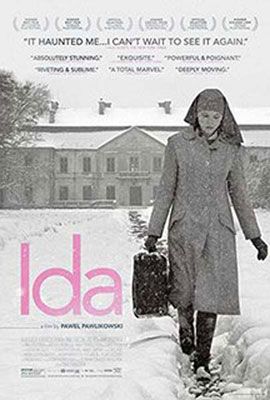Set in 1962, in what is known as a “Period of Normalization” Poland is still reeling from both the aftermath of the Holocaust and a fading Communist regime, while slowly being encroached upon by Socialist ideals and Western values. In a small village outside of Warsaw, the film opens on a novitiate nun named Anna who is touching up the paint on a statue of Jesus. While shot in black and white, the film is muted, matte, except for the stark darkness of her eyes and the sliver of light that shines in them, like wet onyx stones.
Anna is informed by her Mother Superior that before she is confirmed, she must meet with her aunt, her sole surviving family member who never sought to claim her after she was orphaned. Wanda, a hardened cynical attorney, is quick to inform Anna that she is in fact Jewish, her real name Ida Lubenstein, and that she didn’t want her and that she should return to the convent. However, the unexpected introduction of a true innocent into her life, a child she turned her back on, throws Wanda into an identity crisis of her own, and she agrees to take Ida to the village where Ida’s parents last lived and were later put to death. Along the way, Wanda reveals that she was once nicknamed “Red Wanda,” and that she sent many “Enemies of the People” to their deaths as a member of the Communist Party.
As the two meet with longtime residents of the village, it becomes apparent that Ida, in her novitiate habit, is welcomed where her Jewish aunt is not. Her family’s homeland becomes a hostile place, which, during WWII, went from a population of 3.5 million Jews to just 100,000. Her aunt is as cutthroat and direct as Ida is innocent and passive, but both work together to draw out the answers from those that can proffer them. In the end, unraveling their disparate identities, finally knowing the full story, has consequences that neither can fully escape.
This film, at first glance a simple story of two very different woman confronting pasts that were either avoided or hidden, speaks strongly to the conflicted identities of Poland from the 1940s to the 1960s. Long established religions and regimes clashed, resulting in some of the greatest transgressions of the 20th Century, and victims of one era became the persecutors of the next. Ida’s story of a person whose fate was determined by the identity bestowed upon her through no choice of her own, mirrors that of her countrymen, who were flung into a reactive identity crisis that left many wondering what exactly they should stand for in order to survive.

